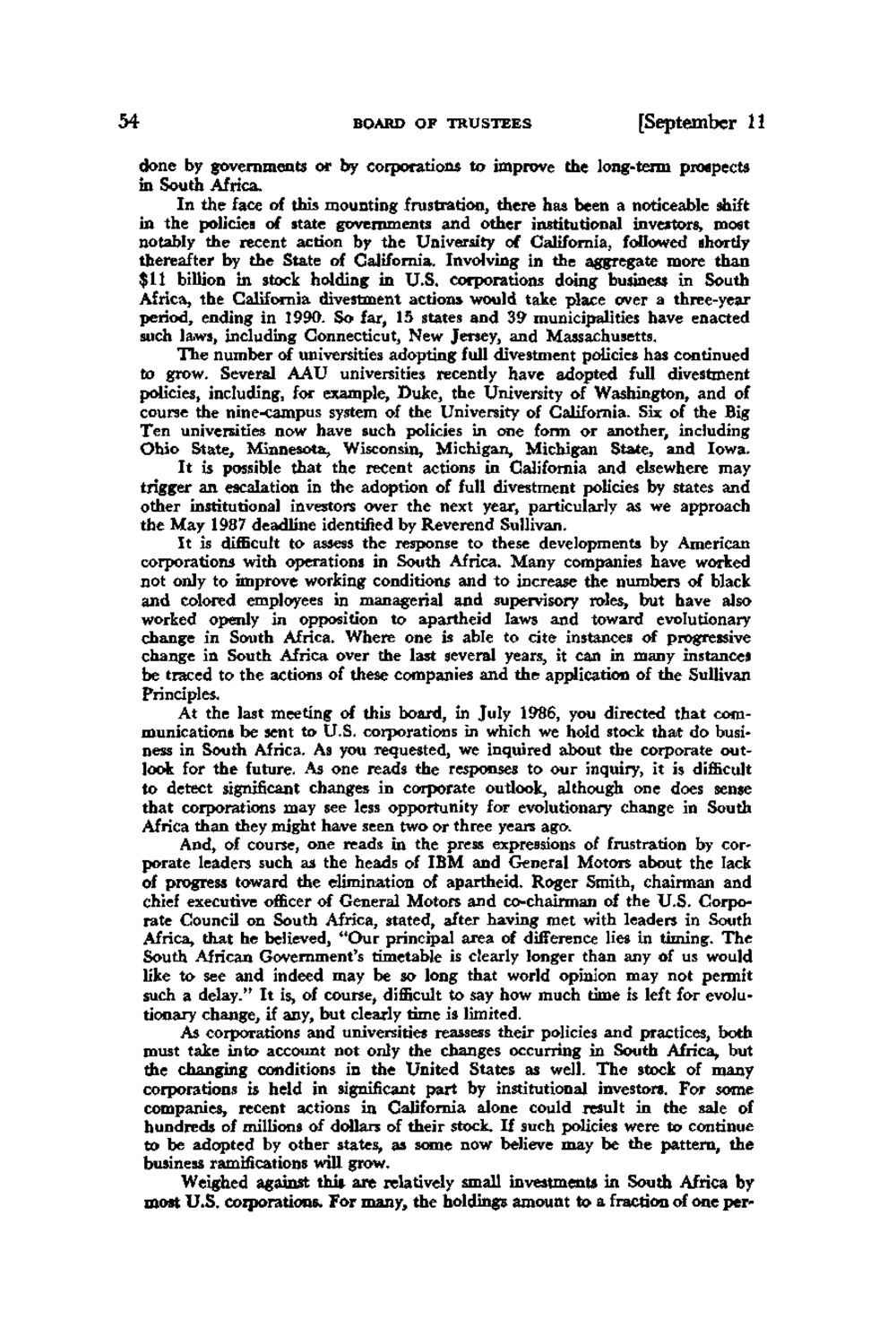| |
| |
Caption: Board of Trustees Minutes - 1988
This is a reduced-resolution page image for fast online browsing.

EXTRACTED TEXT FROM PAGE:
54 BOARD O F TRUSTEES [September 11 done by governments or by corporations to improve the long-term prospects in South Africa. In the face of this mounting frustration, there has been a noticeable shift in the policies of state governments and other institutional investors, most notably the recent action by the University of California, followed shortly thereafter by the State of California. Involving in the aggregate more than $11 billion in stock holding in U.S. corporations doing business in South Africa, the California divestment actions would take place over a three-year period, ending in 1990. So far, 15 states and 39 municipalities have enacted such laws, including Connecticut, New Jersey, and Massachusetts. T h e number of universities adopting full divestment policies has continued to grow. Several AAU universities recently have adopted full divestment policies, including, for example, Duke, the University of Washington, and of course the nine-campus system of the University of California. Six of the Big Ten universities now have such policies in one form or another, including Ohio State, Minnesota, Wisconsin, Michigan, Michigan State, and Iowa. I t is possible that the recent actions in California and elsewhere may trigger an escalation in the adoption of full divestment policies by states and other institutional investors over the next year, particularly as we approach the May 1987 deadline identified by Reverend Sullivan. It is difficult to assess the response to these developments by American corporations with operations in South Africa. Many companies have worked not only to improve working conditions and to increase the numbers of black and colored employees in managerial and supervisory roles, but have also worked openly in opposition to apartheid laws and toward evolutionary change in South Africa. Where one is able to cite instances of progressive change in South Africa over the last several years, it can in many instances be traced to the actions of these companies and the application of the Sullivan Principles. At the last meeting of this board, in July 1986, you directed that communications be sent to U.S. corporations in which we hold stock that do business in South Africa. As you requested, we inquired about the corporate outlook for the future. As one reads the responses to our inquiry, it is difficult to detect significant changes in corporate outlook, although one does sense that corporations may see less opportunity for evolutionary change in South Africa than they might have seen two or three years ago. And, of course, one reads in the press expressions of frustration by corporate leaders such as the heads of IBM and General Motors about the lack of progress toward the elimination of apartheid. Roger Smith, chairman and chief executive officer of General Motors and co-chairman of the U.S. Corporate Council on South Africa, stated, after having met with leaders in South Africa, that he believed, " O u r principal area of difference lies in timing. T h e South African Government's timetable is clearly longer than any of us would like to see and indeed may be so long that world opinion may not permit such a delay." It is, of course, difficult to say how much time is left for evolutionary change, if any, but clearly time is limited. As corporations and universities reassess their policies and practices, both must take into account not only the changes occurring in South Africa, but the changing conditions in the United States as well. T h e stock of many corporations is held in significant part by institutional investors. For some companies, recent actions in California alone could result in the sale of hundreds of millions of dollars of their stock. If such policies were to continue to be adopted by other states, as some now believe may be the pattern, the business ramifications will grow. Weighed against this are relatively small investments in South Africa by most U.S. corporations. For many, the holdings amount to a fraction of one per-
| |